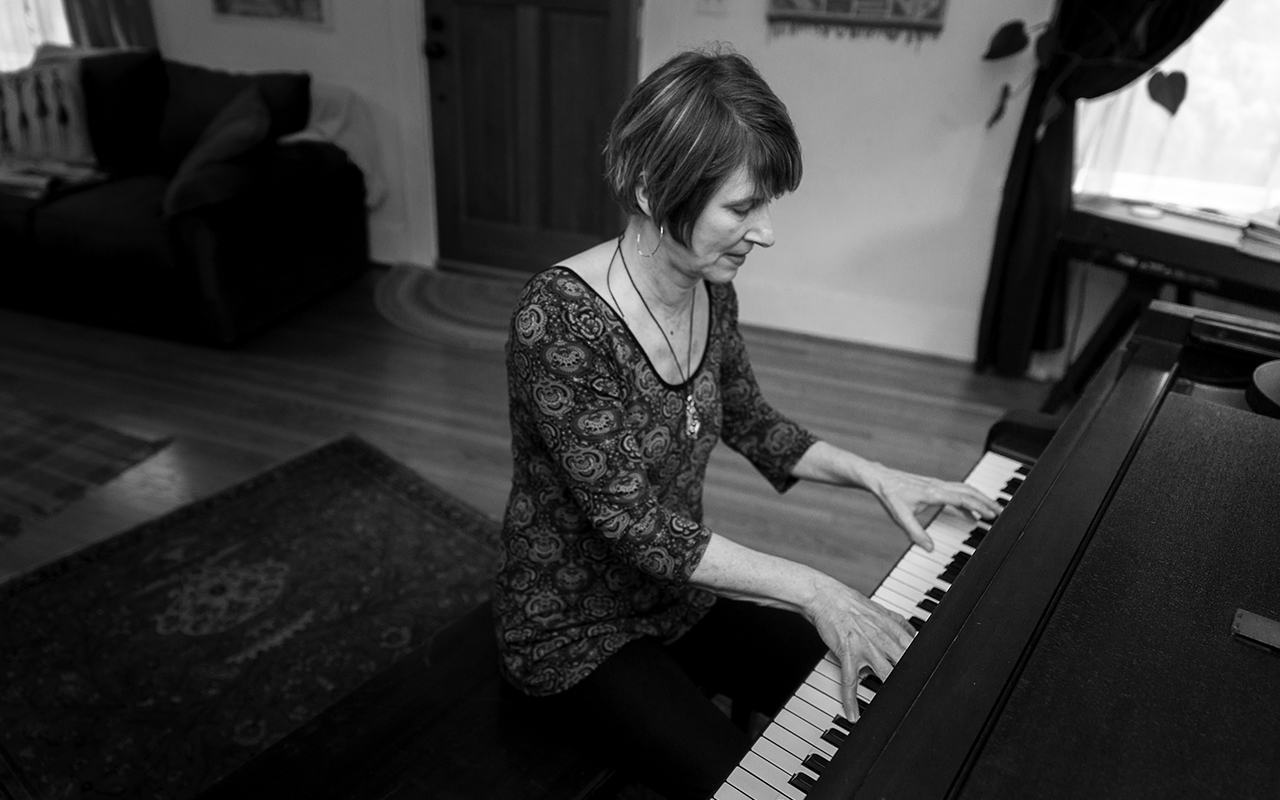
Ann Reynolds photo by Daniel Sheehan
Do our genes define who we are? If there’s a list of jazz musicians who’ve ever pondered such a question – and had the credentials to do so – pianist/composer Ann Reynolds should be at the top.
Seattleites might know her from her popular Latin jazz outfit, Clave Gringa, that’s been a staple on the local scene in recent years. Or, they might have caught wind of her debut recording as a leader, Para Cuba Con Amor, which received airplay on KPLU and made Earshot’s list of recommended releases in the December 2014 issue.
What Seattleites might not know is that Reynolds holds a Ph.D. in molecular biology from a prestigious East Coast institution (Tufts), was a post-doctoral fellow at an even more prestigious East Coast institution (Harvard), and that her current “day job” is at one of our city’s most prestigious non-profit institutions (Fred Hutchinson). Given this, it’s only fitting that Reynolds and Para Cuba Con Amor both received nominations for this city’s most prestigious jazz awards in the Emerging Artist and NW Recording of the Year categories.
How did this come to be?
“I wasn’t really thinking about a career in music, so I was pursuing my scientific bent,” Reynolds explained when we met recently.
That initial stretch of her scientific bent began at Mount Holyoke College in western Massachusetts, a short distance from the small town of Troy in upstate New York where Reynolds grew up. Though music was not her primary pursuit at Mount Holyoke, she availed herself of the opportunity to spend her elective hours studying classical piano and composition. When she moved on to Tufts for graduate school, however, she suddenly found herself without a piano. So, what little time she might have had to play the piano was instead spent listening, and the budding scientist began delving into jazz through recordings. Top of mind for her on this particular evening were a Billie Holiday Decca collection she listened to so much she wore it out, and a Bill Evans album she bought because its cover looked appealing.
“What a fortuitous thing to just pick up Bill Evans,” she mused.
It was also fortuitous that Harvard had some DNA lying around that needed analyzing, so Reynolds took up the post-doc position and used some of her newfound income stability to purchase a piano. A research position at the University of Washington brought her to Seattle and soon found her on familiar terrain: pursuing her scientific bent while devoting free time to piano studies, initially with Randy Halberstadt and later with Jerome Gray. (That Gray was and is a strong influence is apparent in the reverence with which she speaks about him.)
Yet another fortuitous event occurred in 2000 when, at a friend’s suggestion, Reynolds enrolled in a program that arranged for American artists to study at the National School of the Arts in Cuba. And who should she wind up studying with there but Andrés Alén – as in the Andrés Alén who played with Arturo Sandoval prior to Sandoval’s defection; as in Andrés Alén the renowned composer and expert on the island nation’s myriad musical forms.
As one could imagine, it was a profound experience. So, she went back. And then she kept going back, and currently goes back every year, using each opportunity to delve deeper into the music while broadening her horizons (she studies percussion and dance in addition to piano and composition). Moreover, the experience galvanized her to find as much time as possible to devote to music.
Reynolds marvels at the people who ask her why she keeps coming.
“They’re like, ‘You’re back. Didn’t you get it all the first year?’” she said, laughing.
“But Cuban music is so deep,” Reynolds emphasized. “There’s so much there.”
This is something many Americans might not fully understand, given the political enmity that has endured since the Cold War.
“One of the consequences of the embargo,” Reynolds said, “is that a lot of our musicians here have never had a chance to study with Cuban musicians. It has a different feel. Even the montunos (rhythmic patterns played on the piano) – when you sit down with a Cuban pianist day after day, you get that it’s a little different.”
Listening to Reynolds talk about Cuban music and the people who’ve helped her learn it, you can hear the sense of awe it still inspires in her. Listening to the sones, danzóns, and boleros on Para Cuba Con Amor, you can hear what it sounds like when someone with the brain of a scientist and soul of a composer falls fortuitously in love with a foreign musical culture.
Catch Ann and Clave Gringa this summer around the Northwest
Friday, May 22, 8pm
North City Bistro (1520 NE 177th St, Shoreline, WA)
Clave Gringa quartet
$10 cover. Reservations encouraged, (206) 325-4447 or info@northcitybistro.com.
Saturday, July 18, 6:30pm
Everett Music at the Marina (1600 W Marine View Dr, Everett, WA)
Clave Gringa sextet
Free, all ages.
Sunday, August 2, 3pm
Edmonds City Park Concert (3rd Ave S & Pine, Edmonds, WA)
Clave Gringa sextet
Free, all ages.
Monday, August 17, 8pm
Rhythm and Rye ( 311 Capitol Way N, Olympia, WA)
Clave Gringa sextet
Donations at the door.